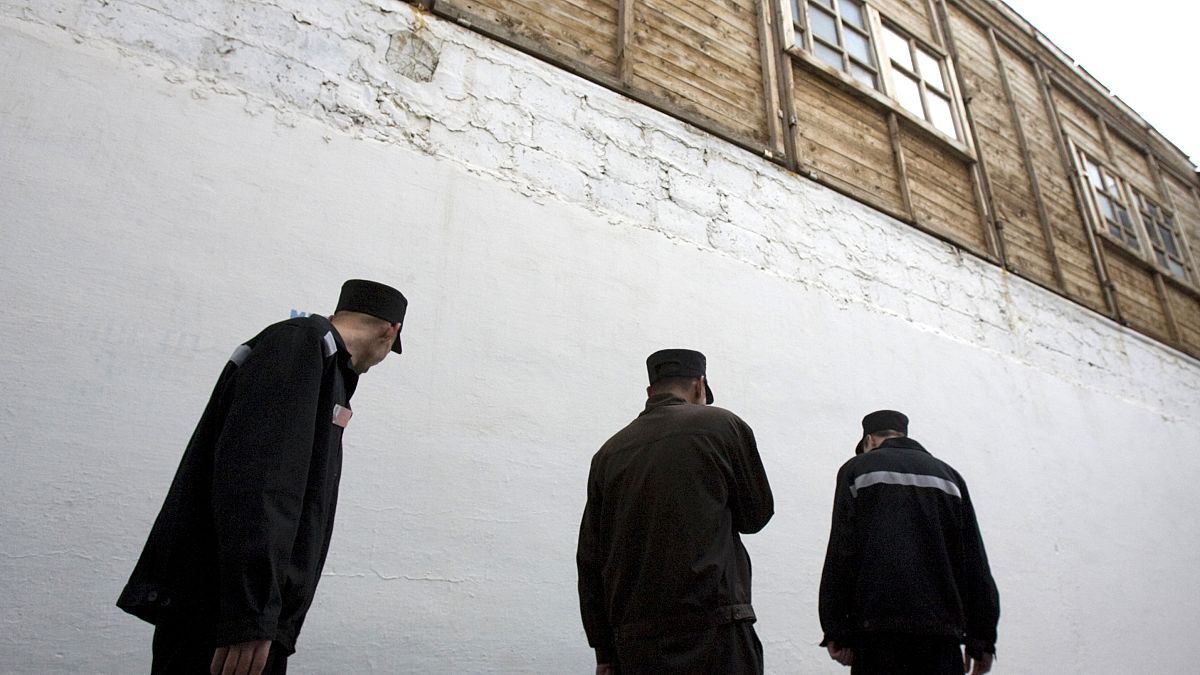Allegations of ill-treatment of prisoners in Russian prisons are not new but Yevgeny Makarov's torture case has brought them to limelight again.
The release of prisoner Yevgeny Makarov, whose torture by prison guards was captured on video, has thrown new limelight on the conditions that prisoners endure inside Russia's prisons.
The Russian penal system is run by the Federal Penitentiary Service (FSIN), which serves under the jurisdiction of the Ministry of Justice. Russia has the fourth highest prison population after the US, China, and Brazil, with a total of 582 889 people in prisons according to the Institute for Criminal Policy Research.
In July, the Novaya Gazeta newspaper released footage of a group of guards at the Yaroslavl prison torturing Makarov. The incident allegedly occurred in 2017.
Makarov’s lawyer Irina Biryukova, who also works with the Public Verdict Foundation, told Euronews torture in Russian prisons has become systemic.
“The torture methods became tougher five to seven years ago, said Biryukova. “(They’ve become) somewhat more sophisticated, such as spaying bleach in the eyes, rape with sticks... Saying this alone is horrific. The prisoners are beaten up as in this video. There is also torture by drowning. There is a whole range of harrowing methods."
Activists argue Makarov is not the only case of human rights violations on the other side of the barbed wire. Other cases of guards beating up prisoners, such as in the Bryansk region (near Belarus), Transbaikal (in eastern Russia), and Omsk (near Kazakhstan), have started to be highlighted by the Russian press.
"Although there are no official statistics, we are talking about hundreds of thousands of people tortured in Russia's penitentiary system a year", said Igor Kalyapin, head of Russia's Committee against Torture.
According to him, the torture is widely spread because it remains unpunished by the Investigative Committee which is entitled to respond to torture complaints. "If this video didn't leak, it would be an ordinary case nobody would pay attention to. The Investigative Committee had already dealt with this case before the video leaked and they didn't see it as a criminal offence. And that's what always happens", explained Kalyapin.
The FSIN has announced preventive measures such as professional aptitude tests for the prison staff and additional criminal code training after the Makarov torture video emerged, Kalyapin thinks they're inefficient. "Does anyone seriously think that the prison staff who tied Makarov to a table and smashed his heels didn't know that it was illegal?" he said. "They know it and if someone reads them the articles in the FSIN code once again, they won't be better professionals. They consciously violate the law because they know they won't be punished for it".
Earlier this week Russia's General Prosecutor's office has presented the head of FSIN Gennadiy Kornienko with two warnings of authority abuse and torture.
About 20 investigations were launched in prisons in various Russian regions, including Yaroslavl, since August.
External monitoring bodies' reports on torture and violence in Russian prisons
The European Court of Human Rights (ECHR) has made various judgements on prisoners in Russia. In the court’s summary of the cases they’ve handled, they mentioned several instances of torture and violence from police officers.
According to information provided by the execution of judgements of the European Court of Human Rights, the Russian government hasn't implemented any of the ECHR's judgments.
The Council of Europe (CoE) has also reported in the past about the violence they've encountered in the country's prison system. A delegation of the CoE's Committee for the prevention of Torture and Inhuman or Degrading Treatment or Punishment (CPT) said they received “allegations of recent physical ill-treatment by members of law enforcement agencies” during a visit to several Russian prisons in 2012.
“In a number of instances, the alleged ill-treatment was of such a severity as to amount to torture.”
A response to the CPT report by the Russian government noted that the FSIN “thoroughly reviews each instance of the use of force and ‘special means’.”
However, since 2012, the CPT has not been able to publish any other report because they’ve been barred by Moscow from doing so, CoE spokeswoman Tatiana Baeva told Euronews.
“Out the 24 reports after regular and ad-hoc visits, only three (in 2001, 2011, and 2012) were published, the remaining 21 reports have not been published," she said.
“Russia remains the only country out of the 47 Council of Europe states that still has not authorised the publication of the majority of the CPT reports,” she added.
Additionally, the CoE’s 2018 prison statistics (based on 2016 data) do not contain information on Russia as the Russian prison administration did not provide any answers.
Euronews has contacted the FSIN for comment.
